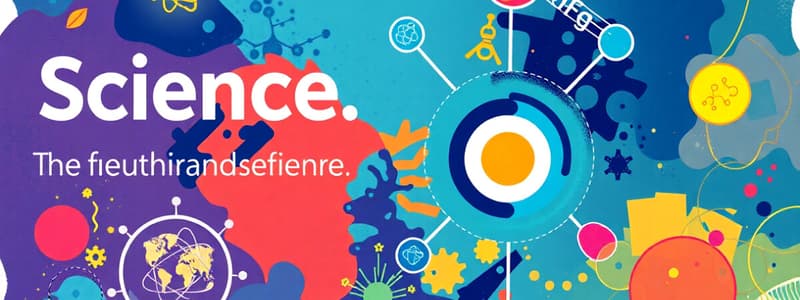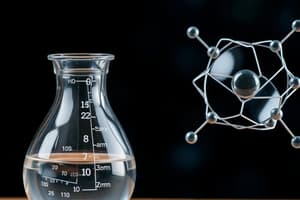Podcast
Questions and Answers
What is the primary focus of natural sciences?
What is the primary focus of natural sciences?
- The study of reasoning and argumentation.
- The study of matter, energy, and forces. (correct)
- The study of mathematical structures.
- The study of living organisms and their environments. (correct)
In which step of the scientific method is a testable explanation formulated?
In which step of the scientific method is a testable explanation formulated?
- Conclusion
- Replication
- Observation
- Hypothesis (correct)
Which of the following best describes a scientific theory?
Which of the following best describes a scientific theory?
- A statement based on observed patterns.
- A mere guess about how things work.
- A well-substantiated explanation of natural phenomena. (correct)
- A definitive fact established by experiments.
What does the process of peer review ensure?
What does the process of peer review ensure?
Which branch of science includes the study of social relationships and institutions?
Which branch of science includes the study of social relationships and institutions?
What is the importance of ethics in science?
What is the importance of ethics in science?
Which of the following is an example of interdisciplinary science?
Which of the following is an example of interdisciplinary science?
What is the goal of the analysis step in the scientific method?
What is the goal of the analysis step in the scientific method?
Flashcards are hidden until you start studying
Study Notes
Definition of Science
- Systematic enterprise that builds and organizes knowledge.
- Involves observation, experimentation, and analysis.
Major Branches of Science
-
Natural Sciences
- Physics: Study of matter, energy, and the forces that govern them.
- Chemistry: Study of substances, their properties, reactions, and transformations.
- Biology: Study of living organisms and their interactions with the environment.
-
Formal Sciences
- Mathematics: Study of numbers, quantities, shapes, and patterns.
- Logic: Study of reasoning and argumentation.
-
Social Sciences
- Psychology: Study of mind and behavior.
- Sociology: Study of society, social institutions, and social relationships.
- Economics: Study of the production, distribution, and consumption of goods and services.
Scientific Method
- Observation: Identifying phenomena to study.
- Hypothesis: Formulating a testable explanation.
- Experimentation: Conducting experiments to test hypotheses.
- Analysis: Interpreting data collected from experiments.
- Conclusion: Drawing conclusions based on analysis.
- Replication: Repeating experiments to verify results.
Importance of Science
- Leads to technological advancements.
- Enhances understanding of the natural world.
- Informs public policy and decision making.
- Promotes critical thinking and problem-solving skills.
Key Concepts
- Theory: A well-substantiated explanation of some aspect of the natural world.
- Law: A statement based on repeated experimental observations that describe some aspect of the world.
- Peer Review: Process by which scientific work is evaluated by others in the field before publication.
Ethics in Science
- Importance of integrity in research.
- Responsibilities regarding the impact of scientific discoveries on society and the environment.
Interdisciplinary Science
- Areas where multiple scientific disciplines intersect, e.g., biochemistry, environmental science, and cognitive science.
Definition of Science
- Science is a systematic process for gaining and organizing knowledge about the world.
- This process involves observation, experimentation, and analysis.
Major Branches of Science
- Natural Sciences explore the physical world and its phenomena.
- Physics studies matter, energy, and how they interact.
- Chemistry investigates the composition, structure, and properties of matter.
- Biology examines living organisms and their relationships with their environment.
- Formal Sciences deal with abstract systems and structures.
- Mathematics studies numbers, quantities, shapes, and patterns.
- Logic explores reasoning, arguments, and the principles of valid inference.
- Social Sciences focus on human societies and behavior.
- Psychology investigates the mind, behavior, and mental processes.
- Sociology studies societies, social institutions, and social interactions.
- Economics examines the production, distribution, and consumption of goods and services.
Scientific Method
- The scientific method is a structured approach to investigating phenomena.
- It involves a series of steps:
- Observation: Identifying a phenomenon or problem to study.
- Hypothesis: Proposing a testable explanation for the observation.
- Experimentation: Designing and conducting experiments to test the hypothesis.
- Analysis: Analyzing data collected from experiments.
- Conclusion: Drawing inferences and conclusions based on the analysis.
- Replication: Repeating experiments to confirm results and validity.
Importance of Science
- Science drives technological innovation and development.
- It deepens our understanding of the natural world and its processes.
- Scientific knowledge informs public policy decisions and societal actions.
- It fosters critical thinking, problem-solving skills, and a rational approach to understanding.
Key Concepts
- Theory: A well-supported explanation for a phenomenon, based on extensive evidence and observations.
- Law: A concise statement that describes an observed pattern or relationship in nature, often expressed mathematically.
- Peer Review: A process where experts in a field evaluate scientific research before publication, ensuring quality and rigor.
Ethics in Science
- Scientific research demands integrity, honesty, and transparency.
- Scientists have a responsibility to consider the ethical implications of their research and its potential impact on society and the environment.
Interdisciplinary Science
- Interdisciplinary Science combines different scientific disciplines to address complex problems.
- Examples include biochemistry (biology and chemistry), environmental science (biology, chemistry, and earth sciences), and cognitive science (psychology, computer science, and neuroscience).
Studying That Suits You
Use AI to generate personalized quizzes and flashcards to suit your learning preferences.




